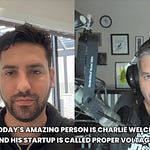Jonathan Taplin is a writer, producer, and Director Emeritus of the Annenberg Innovation Lab at the University of Southern California. He's had an amazing career as outlined in his book The Magic Years and recently published a book, The End of Reality, about the failure of our "great thinkers" to prepare us for a humane future.
In this podcast we talk about the failure of the 1960s that directly led to our culture of despair and he offers some small ways we can resist - and survive - the coming crisis.
Our theme music is by Policy AKA Mark Buchwald. (https://freemusicarchive.org/music/policy/)
Transcript
John Biggs
Welcome back to Keep Going a podcast about success and failure. I'm John Biggs. Today on the show we have Jonathan Taplin. He is a writer, film producer, Director Emeritus of the Annenberg Innovation Lab at the University of Southern California, and the author of two of my favorite recent books, The Magic Years, which was about your life, in amid all these rock and roll stars, and then we have the end of reality, which is about Facebook, Metaverse, crypto, and Mars. Welcome, Jonathan. Good to be here, John. Yeah. So I wanted to the premise of the show is basically about failure. And I think the two books sort of lead up to each other in the sense that The Magic Years was about a very, very special time in history, culture was changing culture changed to a degree that was probably unheard of in recent memory. And then when we come up to now we come up to the End of Reality, we sort of see that high watermark, and then the receding of that culture in the form of social media, which to a degree has destroyed almost everything that you talk about in the magic years, would you is that? Is that a correct statement?
Jonathan Taplin
Yeah, I think so. I mean, you know, Peter Drucker famously said, culture eats strategy for breakfast every morning. And essentially, what he meant was that you can have all the great strategies of how you're going to change the world. But if the culture is not in supportive nothing's going to happen. And so if you think about the 60s in that sense, culture, led politics and ate politics for breakfast every morning. In other words, if you think about 1963, the guy I worked for Bob Dylan, although I wasn't working for him at that point, went down to Mississippi, to Greenwood, and sang it. Voting Rights rallies for the Student Nonviolent Coordinating Committee were a kind of daring thing in the sense that that same town a year later, three civil rights workers were murdered by the Klu Klux Klan. And in the sense that that happened, and nothing happened politically for another three years. In terms of voting rights do so in the sense the culture was out ahead of the politics. And in that sense, the culture played a very important role. I would argue, and I do we in the end of reality that since about 1999, or 2000, the culture has taken a knee holistic turn. So you have the rise of gangster rap. You have the rise of gangster television, in the sense of The Sopranos, leading to the wire leading to match down Breaking Bad succession. In other words, series that all of the important TV series was essentially about bad men struggling for power in a world with no morals whatsoever. And so if you have that for, say, 15 years from 2000, to the winter of 2015, and into the 2016 election, it doesn't surprise me that a bunch of people say, Well, maybe we need Tony Soprano to be president. In other words, you get a Trumpist gangster-type figure, becoming the ruler because you think you need somebody to kick ass and take names on. So that's one element. And of course, the other element is a culture of fantasy and escape, which of course starts in the late 70s with star words, and leads you into a world in which say Marvel the Marvel Cinematic Universe is all about fantasy. You know, it's not tied to anything real. And if you think about the four characters in The End of Reality, Elon Musk, Mark Zuckerberg, Peter Thiel, and Marc Andreessen, they are all deeply involved in fantasy culture. Elon Musk would like us to give him $10 trillion to send 50 people to Mars. You know, Mark Zuckerberg has invested 3 billion 4 billion in this thing called the metaverse in his business plan is that you will spend seven hours a day with a virtual reality helmet on and your life will not be tied to anything real. It will be a complete fantasy world. You know, if you want to, if you admire Tony Stark and the adventures in The Avengers, then you can be Tony Stark, and you can rent Tony Stark's house and put on Tony Stark's, you know, suit and fly around and so, and Marc Andreessen, he wrote this article last week. Yep, calling him techno-utopian. And it is so filled with bullshit that I cannot even imagine. He says, you know, decentralization harnesses complexity for the benefit of everyone. Centralization will starve you. Well, he owns the most centralized NFT platform in the world OpenSea, which has 90% market share. He's an investor in Facebook, which is a monopolist in social media. He says, markets prevent monopolies and cartels, total nonsense. That social media space is monopolized by two firms, Elon Musk, and Mark Zuckerberg. You know, he says, We believe in competition, he doesn't believe in competition at all, we believe in the truth. These mechanisms of social media have been used to spread disinformation on a level that nobody has ever imagined that could be. So um, you know, somehow these people believe that if they say something, you know, they're they're the Uber Munch. They’re straight out of Nietzsche’s playbook, and they ended. And, you know, it verges into fascism, when you get to Thiel and Musk, who have a political point of view, that's pretty damn strong right now. You know, and so. But let's be clear, in terms of your themes of failure, we are headed towards failure. There's just no doubt in my mind, that we are headed towards something that could be incredibly dangerous for humanity. One of the leaders of the AI revolution, gave an interview in Wired last week, and he said, look, he said he was involved in the use of AI for new drug discovery. And he said it's pretty damn good. You know, they said, what it would take just a slightly warped human being to decide that he should use AI to build a bioweapon. And the same technology that he's using on drug discovery could be used for bioweapons. You know, and, and so I think, you know, we're in a, we're in a dangerous place, and nobody's willing to admit to failure, and we're right in the middle.
John Biggs
Is there precedent for this, or is this unprecedented?
Jonathan Taplin
Well, you know, you probably saw Oppenheimer, right? The movie. And there is a point of course, when Oppenheimer has finally witnessed the test, at ALMA Goro, of the bong and he all of a sudden comes to the realization question of what the hell have I done? What have I created? Now that he didn't think about that beforehand? It is kind of scary to me, you know, but needless to say, it informs the whole last half of the movie, in some sense, he then sets out to stop us from creating the next level, bomb, the hydrogen bomb, and needless to say, runs up against the defense establishment, and they trash him. So, I mean, I guess that's the best lesson that I could think of. The problem is that the people who are financing this are like, Marc Andreessen, they never in their lives could imagine that anything that technology has done could do anything wrong. He's early on his essay. Andreessen writes, We believe there was no material problem, whether created by nature or born technology that cannot be solved with more technology. Yet, here Andreessen is the largest investor in autonomous weapons in the country. In other words, he builds most of the software for autonomous weapons. And, you know, I don't know if your listeners know what those are. But sometimes they're called killer robots. That's a weapon in which the AI inside the weapon decides when to pull the trigger. Another return this over is not a guy in a trailer in Las Vegas, running a drone and deciding to pull the trigger. This is a completely autonomous, independent weapon in the same way that, you know, Elon dreams that one day his cars will be autonomous vehicles. They've never been that yet. But you know, anyway.
John Biggs
So, yeah. Now that will this is this is a question that I have regarding that. I think, I think if you connect these two, if you connect the dots, it's a failure of culture, as you said, well, not you didn't say that. So it seems like a failure of culture, right? So in 2000, we had our nihilist movement of, of differ in terms of movies, a little before that you had I forget when that Will Smith movie came out with Gene Hackman, it was about the about EagleEye or something like that when he was being watched. And all this sort of almost dystopian technological film, all these dystopian cultures came out of it. But what's come out recently, and you're a film producer, so maybe you're maybe you're you have some insight on this. What's come on recently is the “after the dystopia” movie. The Hunger Games. To a degree, you could argue that the Harry Potter stuff is technically a dystopia. Because it's a pretty bad situation for most of the movies. Those stories are being told to us but there are no solutions inside those stories. The little guy never gets one over on that on the robots. Right?
Jonathan Taplin
Well, let's, let's go back to your original question. So if you think about the 60s, what went wrong? What failed in the counterculture? And, you know, I would argue, you know, I'm 76. Right. So I was present at the creation.
I would argue that in 1967, there was a sense that the counterculture was winning, in the sense that the opposition to the war in Vietnam was growing and that the Civil Rights Movement had been an extraordinary success. Martin Luther King was now conceiving a bigger plan, you know, to combat poverty that was not based on race at all and was based totally on class. He was called The Poor People's Campaign. It was not called the Black Poor People's Campaign was called The Poor People's Campaign. And he was his attempt to say, look, the problems here are not just racial, the problems are class that the American system and capitalism writ large It just traps a lot of people in poverty. Okay, so what happened? There was incredible pushback against that. And then of course, in 68, Bobby Kennedy came out and joined the anti-war movement in the sense that he says he's gonna oppose Lyndon Johnson's presidency and run on an anti-war platform. And in, I cannot tell you, but it was so visceral that in the spring of 68, I was a junior at Princeton, and we were marching every weekend. And then Martin Luther King gets killed. Two months later, Bobby Kennedy was assassinated. And the heart went out of the movement. And a lot of people, myself included, just concluded, oh, fuck, politics will just break your heart. It's, it's not worth it. It's not worth the pain, and maybe the danger and all of that. And I can tell you that even from the point of view of being around famous musicians like John Lennon and Bob Dylan, they were scared too. And obviously, John Lennon had a right to be scared and ended up being assassinated himself. But the point was, that we gave up and turned to much more internal concerns, whether that was music, drugs, entertainment, self, go to Esalen, and make you feel better, you know, all of this kind of stuff. And that was a total failure. And, of course, what we ended up with was Richard Nixon, you know, and needless to say, one could have the same worries about the next year. It does seem to me what AI is capable of doing in terms of creating disinformation, and we've just seen a real example of it in the last two weeks since the Israeli-Hamas war started. The ability of people to use AI to create massive amounts of disinformation, on social networks is astonishing. And I think they're just getting started. And Musk is said, hey, it's open season, you know, use the platform for what you want.
John Biggs
Is there hope?
Jonathan Taplin
Yeah, there is. I mean, look, I'm not a Doomer. I am trying to think of solutions for these problems, and say to people in general, look, we need to examine these things before it's too late. In other words, now is the time to look at AI and figure out how it could go wrong, and how we could lose control of it. Now is the time to look at disinformation, now is the time to look at what social networks are doing to our polity to our you know, I have a chart I gave, a presentation of, of teenage self-harm. So it's suicide, cuttings, depression, you know, taking drugs, whatever. And it goes is a flatline until 2011. And then it just goes straight up. And what happened in 2011, Facebook, put the Like button. And so now you're in a contest to get likes, your whole meaning becomes, in my light, your whole meaning becomes, how are other people reacting to me, your whole meaning is can I make engagement so people will notice me, your whole meaning becomes this incredibly narcissistic movement, which is now taken over our culture. And that's something we have to confront. And so, as I said, I'm not a Doomer. I just want to find some solutions and the solutions are not in people like Andreessen saying It all there's nothing wrong here. Get out of our way. If you aren't on our side, you're an enemy of progress. And you want to kill people. He said that. You want to kill people.
John Biggs
What was the other line? It was “Love doesn't scale,” which was charming. So okay, so that I think that I think that's that's an interesting movement from the 60s to today. What does what does the world look like? If they're right? And if you're right.
Jonathan Taplin
Okay, so let's see. If they're right, then the world gets economically much more unequal. So Sam Altman, who's the CEO of open AI said that he expected the marginal cost of intelligence to fall very close to zero within 10 years, the earning power of many, many workers would be drastically reduced in that scenario, it would result in a transfer of wealth from labor, to the owners of capital, so dramatic, that it could be remedied only by a massive countervailing redistribution, known as universal basic income. Okay, so Altman, Zuckerberg, Musk, and all these people think that UBI is the solution. In other words, this revolution of AI and robots isn't going to just put blue-collar workers out of work is going to put journalists, it's going to put clerks, it's going to put accountants it's going to put lawyers, it's going to put radiologists, and millions of people out of work. And yet, if you are I proposed to the existing Congress, that they pass a universal basic income. There's not a chance in the world that would happen under the Republican regime right now. So when I was in Washington three weeks ago, I said to a very prominent senator, look, this is coming. And unless you try and think about it, before it hits, you're gonna have people in the street with pitchforks. And he says, Well, that's the only way it'll anything will change. People get in the streets with pitchforks. And that's, that's not a way to run a government. Okay, so that's the dark side, the white side is that we start a resistance movement. And that resistance movement takes place in things like forums like yours. In other words, people suggest that there are other ways of living your life. You know, quit Twitter, to hell with it. Not going to change anything. NPR. I was in Boston last weekend for the Boston Film Festival. And the people at NPR said that they had gone off Twitter because Elon had said they were state media. And so they just quit it. And they assumed that the traffic to their website would drastically fall. And it didn't fall at all. And the woman who ran their social media said we'd been spending hundreds of man hours a week trying to promote ourselves on Twitter. And it was it didn't make any difference.
So I mean, look, the resistance movement takes lots of flavors. It's a young woman who has a restaurant in Maine that surrounds her in the 20 acres surrounding her. People who grow vegetables, people who raise cows, people raise sheep, and people who raise goats, and she has this commune, surrounding her restaurant. And, and it's, you know, it's kind of magical. It takes a place of, you know, I'm involved in the Americana. I'm the chairman of the Americana Music Foundation. So you go down to Nashville two weeks ago. And you have all these people playing Panchos and fiddles and acoustic instruments, and singing in Close harmonies, as if you could have transported yourself back to 1938. And in other words, people who value the cultural past, not people who just thought everything started with Kanye West, you know. So it takes the part of people making documentaries and films that try and dive into this. There was a front line on Elon Musk last week. That was amazing. So I think it's, and it also takes people who are willing to be in the middle of it, who say, hey, wait a minute, we need to stop. You know, we need to think about this. You know, and then that sense, it seems important to me.
John Biggs
Alright, well, I think that's, that's fascinating. I want everybody to grab the book, The End of Reality, How Four Billionaires are Selling a Fantasy Future of the Metaverse, Mars, and Crypto. So we're not going to Mars? Do you think we’re going to hang out here for a little?
Jonathan Taplin
Well, that's what he wants you to think that we should abandon Earth. And you know, instead of fixing the problem, they want us to go off into this fantasy universe. And it's not going to help.
John Biggs
And then I want you to read The Magic Years as well. That was an amazing, basically a travelogue, almost of the of the 60s, just meeting all those people. It's been a real pleasure. I'm glad that I could have you on.
Jonathan Taplin
Thank you, John. Appreciate it.
John Biggs
This has been Keep Going, a podcast about success and failure. I'm John Biggs. We'll see you next week.












